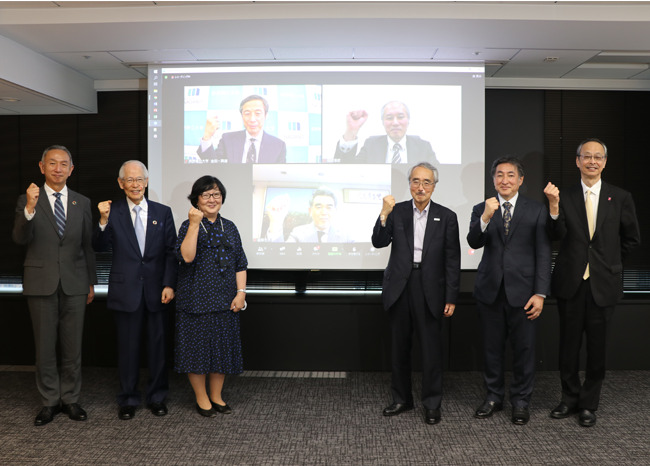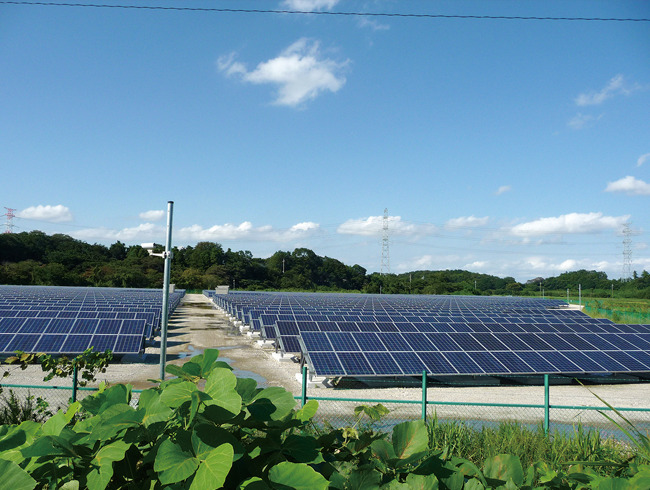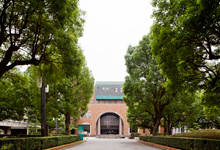
Beyond aiming for a university with 100% renewable energy
Chiba University of Commerce aims to achieve 2023% renewable energy (electricity + gas) for the first time in Japan by 100.
In June 2021, with the aim of reducing the environmental burden associated with university activities through the utilization of natural energy, Chiba University of Commerce, where President Sachihiko Harashina serves as the representative caretaker, International Christian University, Wayo Women's University, and Sacred Heart Women's University Nine universities became founding members and launched the "Renewable Energy University League".In order to increase the number of universities aiming for 6% renewable energy, we will share knowledge, network, mutual study, human resource development, exchange with overseas universities, etc. We are accelerating domestic and overseas activities and activities toward the creation of a society.

On July 2021, 7, the Ministry of Economy, Trade and Industry announced the draft of the new Basic Energy Plan.The plan is to cover 21-2030% of the total power generation in 36 with renewable energy.The draft clearly states that "the introduction will be encouraged based on the principle of giving top priority to renewable energy," and the amount of power generation in FY38 will be raised to 30 billion to 3,300 billion kwh.In other words, how to increase renewable energy is an important issue for Japan in the future.
Chiba University of Commerce has effectively utilized the site of about 2013 m9 (about 4 ha) of Noda Ground (Kamisangao, Noda City, Chiba Prefecture), which was closed at the end of September 6781 due to the relocation of the university's baseball field. "Chiba University of Commerce Mega Solar Noda Power Station" was constructed in the same area with a total construction cost of about 2 million yen, and in April 4.68, it started selling electricity to TEPCO.
Photovoltaic power generation, which can be said to be the representative of renewable energy.However, there are many negative views on the expansion, such as troubles related to the installation of panels and the lack of installation space in Japan.For this reason, it is often argued that coal-fired power generation and the restart of nuclear power plants will be dependent on and continued, but President Sachihiko Harashina asks whether this is really the case.
"Many of the factors that cause negative views on solar power generation are that they open up forests and forcibly install panels on slopes, so consensus building with neighboring residents is not properly formed, and panels due to heavy rain, etc. It is thought that this is because there are a series of troubles such as the collapse of the solar power.
The mega solar set up by the university is a concrete example of the solution, and was built on a flat land on the site of a baseball ground.There are many flat lands in Japan that have not yet been effectively utilized.The site of our university, which was the site of the quarry, is not suitable for agricultural land and is not suitable for housing development because it is inconvenient. We made effective use of the site where it was difficult to use the site.
If you broaden your horizons with this idea, there are now about 46 hectares of agricultural land that is no longer used, which is called abandoned cultivated land.The site of our mega solar is 4.65ha, which is 10 times that.In other words, the land where 10 mega solar can be installed is not used.The annual power generation record of our university is about 370 million kwh, so if it is 10 times that, it will be 3,700 billion kwh.It easily exceeds the government's power generation target of 30-3,300 billion kwh in FY3,500.In other words, depending on the land use plan, it will be possible to achieve the target with only solar power generation.
Of course, in order to use such land, it is necessary to discuss with landowners such as farmers and reach consensus.However, by tackling the problem of decarbonization together, I think that new ideas for coexistence and co-prosperity will be born.It is the ideal form of the leader that we want to nurture, the priest, that will make this possible. "

Chiba University of Commerce advocates the development of "judgmentists" who show "leaders with high ethical standards who stand in the big picture, grasp the changes of the times, and solve various social issues" as the philosophy of education. We have produced many presidents *.In order to move others, the guideline for action is "start from the beginning" that you should act yourself.
"If many universities and companies set goals for each business establishment using our efforts as a model, we will realize a shift to a regional decentralized energy society, create local employment, and change the industrial structure. I'm thinking, "said President Sachihiko Harashina.
* Chiba University of Commerce ranks 49th in the ranking of the number of presidents by university from all over Japan (from "Analysis of Universities from National Presidents (2020)" by Teikoku Data Bank).Currently, there are about 780 universities nationwide.
→Leaders of Sustainable Society
- 1
- 2

